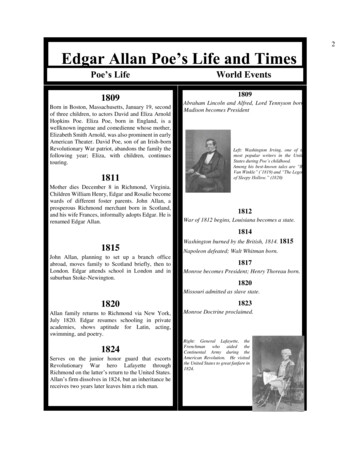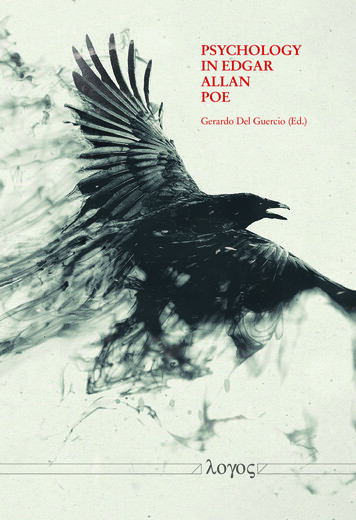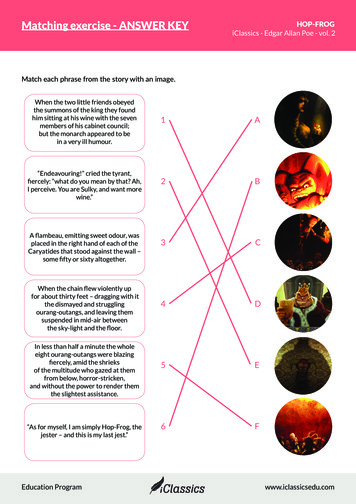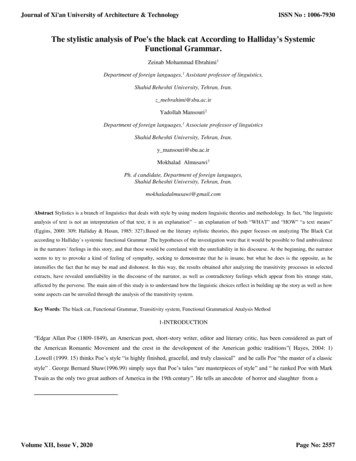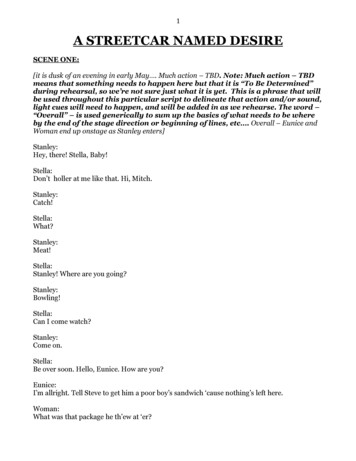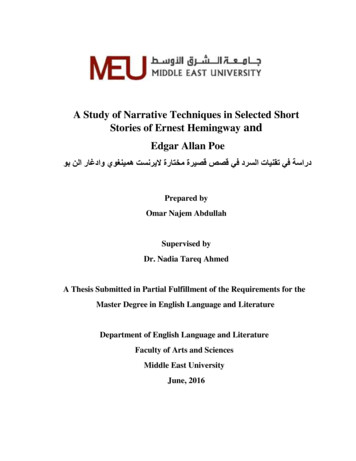
Transcription
For students of English as a Foreign LanguageEdgar Allan Poe:american literary classicss t oryt e ll e rEdgar Allan Poe
Edgar Allan Poe:storytelle rpSeven StoriesAdapted fromEdgar Allan PoepA Ladder Edition at the 4,000-word levelp
Edgar Allan Poe: StorytellerAuthor: Edgar Allan PoeSecond Edition: 2013ISBN (print) 978-1-624-25060-6ISBN (PDF) 978-1-624-25061-3ISBN (ePub) 978-1-624-25062-0ISBN (mobi) 978-1-624-25063-7Adapted and published by:Office of English Language ProgramsBureau of Educational and Cultural AffairsUnited States Department of StateWashington, D.C.americanenglish.state.gov
pThe Ladder Series of books are specially prepared editions of well-known American books. They have beenmade easier to read for the enjoyment of readers forwhom English is a second language.p
p
C O N T E N T SThe Mask of the Red Death1The Story of William WilsonPart OnePart TwoPart ThreePart Four6101418The Fall of the House of UsherPart OnePart TwoPart Three222630The Black Cat34The Murders in the Rue MorguePart OnePart TwoPart ThreePart FourPart FivePart Six384247515560The Tell-Tale Heart64The Cask of Amontillado68Glossary73
E d g a rA l l a nP o e :S t o r y t e l l e rpThe Mask of the Red DeathThe Red deaTh had long been feeding on The counTRy. nosickness had ever been so deadly — so great a killer — or so fearful tosee. Blood was its mark — the redness and the horror of blood. Therewere sharp pains, and a sudden feeling that the mind was rushing incircles inside the head. Then there was bleeding through the skin,though it was not cut or broken — and then, death! The bright redspots upon the body and especially upon the face of the sick man madeother men turn away from him, afraid to try to help. And the sicknesslasted, from the beginning to the end, no more than half an hour.1
E d g a rA l l a nP o eBut Prospero, the ruler of that land, was happy and strong andwise. When half the people of his land had died, he called to him athousand healthy, happy friends, and with them went far away to livein one of his palaces. This was a large and beautiful stone building hehad planned himself. A strong, high wall circled it. This wall had gatesof iron. The gentlemen, after they had entered, brought fire to heatthe iron of the gates to make them close so firmly that nobody couldopen them. Here they could forget the sickness, the Red Death. Theywould leave the outside world to care for itself.Prospero had supplied everything they needed for pleasure.There was music, there was dancing, there was beauty, there was foodto eat and wine to drink. All these were within the wall, and withinthe wall they would be safe. Outside the wall walked the Red Death.It was near the end of their fifth month there that Prospero askedhis friends all to come together for a dancing party, a masquerade.Everyone was asked to come dressed in fine clothes and with his eyes,or perhaps his whole face, covered by a cloth mask.It was a scene of great richness, that masquerade. There wereseven rooms in which Prospero’s friends danced. In many old palacesthe doors can be opened in such a way that rooms like these sevencan be seen all at the same time. In this palace it was different. Littlemore than one of them could be seen at one time. There was a turnevery twenty or thirty yards. To the right and left, in the middle ofeach wall, was a tall pointed window. The windows were of coloredglass, of the same color that was used in each room. The first room hadblue cloth hangings on the walls — and blue were its windows. Thesecond room had wall hangings of that blue-red known as purple, andhere the windows were purple. The third was green, and so was theglass of the windows. The fourth had hangings and windows of yellow— the fifth of white — the sixth of violet. But the seventh room hadhangings on the walls made of a rich soft cloth which was black, blackas night, and the floor, too, was covered with the same heavy blackcloth. In this room the color of the windows was not the same. It wasred — a deep blood color.All the rooms were lighted through the outside windows. Theresulting light was strange indeed, as it colored the shapes of thedancers. But the light that fell on the black hangings through the2
E d g a rA l l a nP o e :S t o r y t e l l e rblood-colored glass was the most fearful of them all. It produced sowild a look on the faces of those who entered that there were few ofthe dancers who dared to step within those dark walls.In this room stood a great clock of black wood. Gently it markedthe seconds as they passed; and when it was time to mark the hour theclock spoke with a loud, clear voice, a deep tone as beautiful as music,but so strange that the music and the dancing stopped and the dancersstood still to listen. And then, after another sixty minutes, afteranother three thousand and six hundred seconds of Time, of flyingTime, the clock struck again, and the dancers stopped as before.Nevertheless, it was a happyand beautiful masquerade. Andyou may be sure that the clothesthe dancers chose to wear, theircostumes, were strange and wonderful. The dancers looked likethe forms we might see in troubled dreams. And these — thedreams — danced softly throughthe rooms, taking the color of therooms as they moved. It did notseem that their steps followed themusic, but that the music rosefrom their steps. But into the seventh room the dancers do not go,for the red light coming throughthe windows, and the blacknessof the wall hangings, make themafraid — and he who enters hearsmore deeply the striking of thegreat black clock.But the other rooms are crowded, and in them beats hotly theheart of life. And the dance goes on until at last the clock begins tostrike twelve. Again the music stopped. Again the dancers stood without moving while the slow striking sound continued. Before the clockwas quiet again, many in the crowd saw that in the first room, the blueroom, there was a masquerader who had not been seen before. As3
E d g a rA l l a nP o ethey talked softly to each other about him a feeling of surprise spreadthrough all the dancers, then a feeling of fear and of sickening horror.In such a group as this, only a very strange masquerader couldhave caused such a feeling. Even among those who laugh at both lifeand death, some matters cannot be laughed at. Everyone seemed nowdeeply to feel that the stranger should not have been allowed to comeamong them dressed in such clothes. He was tall and very thin, andcovered from head to foot like a dead man prepared for the grave. Themask which covered his face — or was it really a mask? — the maskwhich covered his face was so much like the face of a dead man thatthe nearest eye could not see the difference. And yet all this mighthave been acceptable — but the masquerader whom nobody knewhad made himself look like the Red Death itself! His clothes werespotted with blood. And the mask over his face was covered with theterrible red spots or perhaps it was indeed his face!When Prospero looked upon this fearful form he was first filledwith terror — and then with anger. “Who dares?” he cried. “Take him!Seize him! Pull off his mask so that we may know who we must hangat sunrise!”Prospero stood in the blue room when he spoke these words. Theysounded through the seven rooms, loud and clear. At first, as he spoke,some of the dancers started to rush toward the strange masquerader.But they stopped, afraid, and no one dared to put out a hand to touchhim. The stranger started to walk toward the second room. He passedwithin a few feet of Prospero, who stood still, surprised. And whilethe dancers moved back from the center of the room, the strangermoved quietly, without being stopped, with a slow and measured step,through the blue room to the purple room — through the purple roomto the green room — through the green to the yellow — through thisto the white — and then to the violet room.As the stranger was entering the seventh room, Prospero suddenly and angrily rushed through the six rooms. No one dared tofollow him. He held a sharp knife high over his head, ready to strikethe stranger. When he was within three or four feet of the strangemasquerader, the stranger turned and stood silent, looking firmly intoProspero’s eyes. There was a cry — and the knife dropped shiningupon the black floor, upon which a minute later Prospero himself fell,4
E d g a rA l l a nP o e :S t o r y t e l l e rdead. The dancers then rushed into the black room. The strongest ofthe men tried to hold the masquerader, whose tall form stood besidethe black clock; but when they put their hands on him they foundinside the grave-clothes no human form, no body — nothing!Now they knew that it was the Red Death itself that had come inthe night. One by one the dancers fell, and each died as he fell. Andthe fires died. And the clock stopped. And darkness and decay andthe Red Death ruled forever over all.5
E d g a rA l l a nP o epLMen usually become bad by degrees. But I let all goodness fallfrom me in a single moment, as if I had dropped a coat. From smallacts of darkness I passed, in one great step, into the blackest evil everknown. Listen while I tell of the one cause that made this happen.Death is near, and its coming has softened my spirit. I desire, inpassing through this dark valley, the understanding of other men. Iwish them to believe that I have been, in some ways, in the power offorces beyond human control. I wish them to find for me, in the storyI am about to tell, some small fact that proves I could have done onlywhat I did. I would have them agree that what happened to me neverhappened to other men. Is it not true that no one has ever sufferedas I do? Have I not indeed been living in a dream? And am I not nowdying from the horror and the unanswered question — the mystery ofthe wildest dream ever dreamed on earth?I am one of a family well known for their busy minds. As a smallchild I showed clearly that I too had the family character. As I becameolder it grew more powerful in me. For many reasons it became a causeof talk among friends, and the hurt it did me was great. I wanted people always to do things my way; I acted like a wild fool; I let my desirescontrol me.6
E d g a rA l l a nP o e :S t o r y t e l l e rMy father and mother, weak in body and mind, could do littleto hold me back. When their efforts failed, of course my will grewstronger. From then on my voice in the house was law. At an age whenfew children are allowed to be free, I was left to be guided by my owndesires. I became the master of my own actions.I remember my first school. It was in a large house about threehundred years old, in a small town in England, among a great numberof big trees. All of the houses there were very old. In truth, it was adream-like and spirit-quieting place, that old town. At this momentI seem to feel the pleasant coolness under the shade of the trees, Iremember the sweetness of the flowers, I hear again with delight Icannot explain the deep sound of the church bell each hour breakingthe stillness of the day.It gives me pleasure to think about this school — as much pleasure, perhaps, as I am now able to experience. Deep in suffering asI am — suffering only too real — perhaps no one will object if fora short time I forget my troubles and tell a little about this period.Moreover, the period and place are important. It was then and therethat I first saw, hanging over me, the terrible promise of things tocome. Let me remember.The house where we boys lived and went to school was, as I havesaid, old and wide. The grounds about it were large, and there was ahigh wall around the outside of the whole school. Beyond this wall wewent three times in each week, on one day to take short walks in theneighboring fields, and two times on Sunday to go to church. Thiswas the one church in the village, and the head-teacher of our schoolwas also the head of the church. With a spirit of deep wonder and ofdoubt I used to watch him there! This man, with slow step and quiet,thoughtful face, in clothes so different and shining clean — couldthis be the same man who with a hard face and clothes far from cleanstood ready to strike us if we did not follow the rules of the school?Oh, great and terrible question, beyond my small power to answer!I well remember our playground, which was behind the house.There were no trees, and the ground was as hard as stone. In front ofthe house there was a small garden, but we stepped into this gardenonly at very special times, such as when we first arrived at school, orwhen we left it for the last time, or perhaps when father or mother ora friend came to take us away for a few days.7
E d g a rA l l a nP o eBut the house! — what adelightful old building it was— to me truly a palace! Therewas really no end to it. I wasnot always able to say certainlywhich of its two floors I happened to be on. From eachroom to every other there werealways three or four steps eitherup or down. Then the roomsbranched into each other, andthese branches were too manyto count, and often turned andcame back upon themselves!Our ideas about the whole greathouse were not very far differentfrom the thoughts we had abouttime without end. During thefive years I was there, I couldnever have told anyone how tofind the little room where I and some eighteen or twenty other boysslept. The schoolroom was the largest room in the house — and Icouldn’t help thinking it was the largest in the world. It was long andlow, with pointed windows and heavy wood overhead. In a far cornerwas the office of our head-teacher, Mr. Bransby. This office had a thickdoor, and we would rather have died than open it when he was notthere.Inside the thick walls of this old school I passed my years fromten to fifteen. Yet I always found it interesting. A child’s mind doesnot need the outside world. In the quiet school I found more brightpleasure than I found later, as a young man, in riches, or, as an olderman, in wrongdoing.Yet I must have been different indeed from most boys. Few menremember much of their early life. My early days stand out as clearand plain as if they had been cut in gold. In truth the hotness of mycharacter and my desire to lead and command soon separated mefrom the others. Slowly I gained control over all who were not greatly8
E d g a rA l l a nP o e :S t o r y t e l l e rolder than myself — over all except one. This exception was a boywho, though not of my family, had the same name as my own, WilliamWilson. This boy was the only one who ever dared to say he did notbelieve all I told him, and who would not follow my commands.This troubled me greatly. I tried to make the others think thatI didn’t care. The truth was that I felt afraid of him. I had to fight toappear equal with him, but he easily kept himself equal with me. Yetno one else felt, as I did, that this proved him the better of the two.Indeed, no one else saw the battle going on between us. All hisattempts to stop me in what I wanted to do were made when no oneelse could see or hear us. He did not desire, as I did, to lead the otherboys. He seemed only to want to hold me back. Sometimes with wonder, and always without pleasure, I saw that his manner seemed toshow a kind of love for me. I did not feel thankful for this; I thought itmeant only that he thought himself to be very fine indeed, better thanme. Perhaps it was this love he showed for me, added to the fact thatwe had the same name, and also that we had entered the school onthe same day, which made people say that we were brothers. Wilsondid not belong to my family, even very distantly. But if we had beenbrothers we would have been near to each other indeed, for I learnedthat we were both born on the nineteenth of January, eighteen hundred and nine. This seemed a strange and wonderful thing.9
E d g a rA l l a nP o epThe Story of William WilsonP a r t Tw oin The fiRsT paRT of my sToRy i spoke abouT my life aT my fiRsTschool, and about the other boys — over whom I gained firm control.But there was one boy who would not follow my commands, whowould not do what I told him to, as the other boys did. His name wasthe same as mine — William Wilson — although he did not belongto my family in any way. He seemed to feel some love for me, and hadentered the school the same day as I had. Many of the boys thought wewere brothers. I soon discovered that we had been born on the sameday: January nineteenth, eighteen hundred and nine.Wilson continued his attempts to command me, while I continued my attempts to rule him. The strange thing is that, although I didnot like him, I could not hate him. We had a battle nearly every day,it is true. In public it would seem that I had been proved the stronger;but he seemed somehow able to make me feel that this was not true,and that he himself was stronger. Nevertheless, we continued to talkto each other in a more or less friendly way. On a number of subjectswe agreed very well. I sometimes thought that if we had met at another time and place we might have become friends.It is not easy to explain my real feelings toward him. There wasno love, and there was no fear. Yet I saw something to honor in him,and I wanted to learn more about him. Anyone experienced in humannature will not need to be told that Wilson and I were always together.This strange appearance of friendship — although we were notfriends — caused, no doubt, the strangeness of the battle between us.I tried to make the others laugh at him; I tried to give him pain whileseeming to play a lighthearted game. My attempts were not always10
E d g a rA l l a nP o e :S t o r y t e l l e rsuccessful, even though my plans were well made. There was muchabout his character that simply could not be laughed at.I could find, indeed, but one weakness. Perhaps he had beenborn with it, or perhaps it had come from some illness. No one but mewould have made any use of it against him. He was able to speak onlyin a very, very soft, low voice. This weakness I never failed to use inany way that was in my power.Wilson could fight back, and he did. There was one way he had oftroubling me beyond measure. I had never liked my name. Too manyother people had the same name; I would rather have had a name thatwas not so often heard. The words sickened me. When, on the day Iarrived at the school, a second William Wilson came also, I felt angrywith him for having the name. I knew I would have to hear the nameeach day a double number of times. The other William Wilson wouldalways be near. The other boys often thought that my actions and mybelongings were his, and his were mine.My anger grew stronger with every happening that showed thatWilliam Wilson and I were alike, in body or in mind. I had not thendiscovered the surprising fact that we were of the same age; but I sawthat we were of the same height, and I saw that in form and in facewe were also much the same. Nothing could trouble me more deeply(although I carefully tried to keep everyone from seeing it) than tohear anyone say anything about the likeness between us of mind, or ofbody, or of anything else. But, in truth, I had no reason to believe thatthis likeness was ever noticed by our school fellows. He saw it, and asclearly as I; that, I knew well. He discovered that in this likeness hecould always find a way of troubling me. This proved the more thanusual sharpness of his mind.His method, which was to increase the likeness between us,lay both in words and in actions; and he followed his plan very wellindeed. It was easy enough to have clothes like mine. He easily learnedto walk and move as I did. His voice, of course, could not be as loudas mine, but he made his manner of speaking the same.How greatly this most careful picture of myself troubled me, Iwill not now attempt to tell. It seemed that I was the only one whonoticed it. I was the only one who saw Wilson’s strange and knowingsmiles. Pleased with having produced in my heart the desired result,11
E d g a rA l l a nP o ehe seemed to laugh within himself and cared nothing that no onelaughed with him.I have already spoken of how he seemed to think he was betterand wiser than I. He would try to guide me; he would often try to stopme from doing things I had planned. He would tell me what I shouldand should not do; and he would do this not openly, but in a word ortwo in which I had to look for the meaning. As I grew older I wantedless and less to listen to him.As it was, I could not be happy under his eyes, that alwayswatched me. Every day I showed more and more openly that I didnot want to listen to anything he told me. I have said that, in the firstyears when we were in school together, my feelings might easily havebeen turned into friendship; but in the later months, although hetalked to me less often then, I almost hated him.Yet, let me be fair to him. I can remember no time when what hetold me was not wiser than would be expected from one of his years.His sense of what was good or bad was sharper than my own. I might,today, be a better and happier man if I had more often done what hesaid.It was about the same period, if I remember rightly, that bychance he acted more openly than usual and I discovered in his manner something that deeply interested me. Somehow he brought tomind pictures of my earliest years — I remembered, it seemed, thingsI could not have remembered. These pictures were wild, half-lighted,and not clear, but I felt that very long ago I must have known thisperson standing before me. This idea, however, passed as quickly as ithad come.It was on this same day that I had my last meeting at the schoolwith this other, strange William Wilson. That night, when everyonewas sleeping, I got out of bed, and with a light in my hand, I wentquietly through the house to Wilson’s room. I had long been thinkingof another of those plans to hurt him, with which I had until then hadlittle success. It was my purpose now to begin to act according to thisnew plan.Having reached his room, I entered without a sound, leaving thelight outside. I advanced a step, and listened. He was asleep. I turned,took the light, and again went to the bed. I looked down upon his face.12
E d g a rA l l a nP o e :S t o r y t e l l e rThe coldness of ice filled my whole body. My knees trembled,my whole spirit was filled with horror. I moved the light nearer to hisface. Was this — this the face of William Wilson? I saw indeed thatit was, but I trembled as if with sickness as I imagined that it was not.What was there in his face to trouble me so? I looked, and my mindseemed to turn in circles in the rush of my thoughts. It was not likethis — surely not like this — that he appeared in the daytime. Thesame name, the same body; the same day that we came to school! Andthen there was his use of my way of walking, my manner of speaking!Was it, in truth, humanly possible that what I now saw was the result— and the result only — of his continued efforts to be like me? Filledwith wonder and fear, cold and trembling, I put out the light. In thequiet darkness I went from his room and, without waiting one minute,I left that old school and never entered it again.13
E d g a rA l l a nP o epThe Story of William WilsonPart ThreeYIt was not like this — surely not like this — that he appeared inthe daytime. The same name, the same face, the same body, the sameday of coming to school! And then his use of my way of walking, mymanner of speaking! Was it, in truth, humanly possible that what Inow saw was the result and the result only — of his continued effortsto be like me? Afraid, I left the old school and never entered it again.After some months at home, doing nothing, I went to study at thefamous school called Eton. I had partly forgotten my days at the otherschool, or at least my feelings about those days had changed. Thetruth — the terrible truth — of what had happened there was gone.Now I doubted what I remembered. Now I called the subject into mymind only to smile at the strength of the strange ideas and thoughtsI had once had.My life at Eton did not change this view. The fool’s life intowhich I carelessly threw myself washed away everything that wasvaluable in my past. I do not wish, however, to tell here the story of mywrongdoing — wrongdoing which went against every law of the schooland escaped the watchful eyes of all the teachers. Three years of this14
E d g a rA l l a nP o e :S t o r y t e l l e rhad passed and I had grown much larger in body and smaller in soul.Three years of wrongdoing had made me evil.One night I asked a group of friends who were as evil as I to cometo a secret meeting in my room. We met at a late hour. There wasstrong drink, and there were games of cards and loud talking until thenew day began appearing in the east. Warm with the wine and withthe games of chance, I was raising my glass to drink in honor of someespecially evil idea, when I heard the voice of a servant outside theroom. He said that someone had asked to speak with me in anotherroom.I was delighted. A few steps brought me into the hall of the building. In this room no light was hanging. But I could see the form of ayoung man about my own height, wearing clothes like those I myselfwas wearing. His face I could not see. When I had entered he camequickly up to me, and, taking me by the arm, he said softly in my ear:“William Wilson!”There was something in the manner of the stranger, and in thetrembling of his uplifted finger, which made my eyes open wide; but itwas not this which had so strongly touched my mind and heart. It wasthe sound of those two, simple, well-known words, William Wilson,which reached into my soul. Before I could think again and speak, hewas gone.For some weeks I thought about this happening. Who and whatwas this Wilson? — where did he come from? — and what were hispurposes? I learned that for family reasons he had suddenly left theother school on the afternoon of the day I myself had left it. But in ashort time I stopped thinking about the subject; I gave all my thoughtto plans for study at Oxford University.There I soon went. My father and mother sent me enough moneyto live like the sons of the richest families in England. Now my natureshowed itself with double force. I threw aside all honor. Among thosewho spent too much money, I spent more; and I added new forms ofwrongdoing to the older ones already well-known at the university.And I fell still lower. Although it may not be easily believed, it isa fact that I forgot my position as a gentleman. I learned and used allthe evil ways of those men who live by playing cards. Like such skilledgamblers, I played to make money.15
E d g a rA l l a nP o eMy friends trusted me, however. To them I was the laughing buthonorable William Wilson, who freely gave gifts to anyone and everyone, who was young and who had some strange ideas, but who neverdid anything really bad.For two years I was successful in this way. Then a young mancame to the university, a young man named Glendinning, who, peoplesaid, had quickly and easily become very rich. I soon found him ofweak mind. This, of course, made it easy for me to get his money byplaying cards. I played with him often.At first, with the gambler’s usual skill, I let him take money fromme. Then my plans were ready. I met him one night in the room ofanother friend, Mr. Preston. A group of eight or ten persons werethere. By my careful planning I made it seem that it was chance thatstarted us playing cards. In fact, it was Glendinning himself who firstspoke of a card game.We sat and played far into the night, and at last the othersstopped playing. Glendinning and I played by ourselves, while theothers watched. The game was the one I liked best, a game called“écarté.” Glendinning played with a wild nervous ness that I could notunderstand, though it was caused partly, I thought, by all the wine hehad been drinking. In a very short time he had lost a great amount ofmoney to me.Now he wanted to double the amount for which we played. Thiswas as I had planned, but I made it seem that I did not want to agree.At last I said yes. In an hour he had lost four times as much moneyas before.For some reason his face had become white. I had thought himso rich that losing money would not trouble him, and I believed thiswhiteness, this paleness, was the result of drinking too much wine.Now, fearing what my friends might say about me, I was about to stopthe game when his broken cry and the wild look in his eyes made meunderstand that he had lost everything he owned. Weak of mind andmade weaker by wine, he should never have been allowed to play thatnight. But I had not stopped him; I had used his condition to destroyhim.16
E d g a rA l l a nP o e :S t o r y t e l l e rThe room was very quiet. I could feel the icy coldness in myfriends. What I would have done I cannot say, for at that momentthe wide heavy doors of the room were suddenly opened. Every lightin the room went out, but I had seen that a man had entered; he wasabout my own height, and he was wearing a very fine, long coat. Thedarkness, however, was now complete, and we could only feel thathe was standing among us. Then we heard his voice. In a soft, low,never-to-be-forgotten voice, which I felt deep in my bones, he said:“Gentlemen, I am here only to do my duty. You cannot know thetrue character of the man who has tonight taken a large amount ofmoney from Mr. Glendinning. Please have him take off his coat, andthen, look in it very carefully.”While he was speaking there was not another sound in the room.And as he ended, he was gone!17
E d g a rA l l a nP o epThe Story of William WilsonPart FourAs I ended the last part ofmy story, I was speaking of thatterrible evening when I playedcards with a young gentle mancalled Glendinning. We were inthe room of one of my friends atOxford University. I had just realized that the young man, weakof mind and weakened by wine
tions of well-known American books. They have been made easier to read for the enjoyment of readers for whom English is a second language. The series is built on a “ladder” of five steps—from 1,000 to 5,000 different English words. The books have been shortened, but they keep the ideas, facts, and plea-

